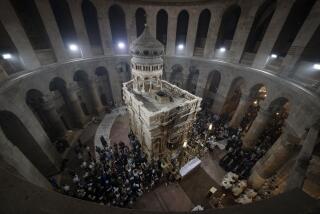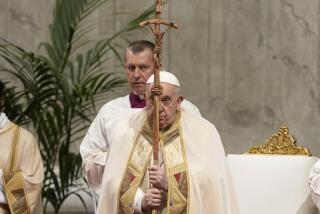PLO, Vatican Warn Israel on Jerusalem
- Share via
VATICAN CITY — Five weeks before a papal visit to Jerusalem and the Holy Land, the Vatican and the Palestine Liberation Organization joined Tuesday to warn Israel that any attempt by the Jewish state to control the disputed city’s fate is “morally and legally unacceptable.”
An Israeli spokesman called the rebuke an untimely and unwelcome interference by the Vatican in Israeli-Palestinian peace talks on the very issue that led to their recent breakdown. Israel’s Foreign Ministry said the Vatican’s representative in Israel had been asked to come to an “urgent meeting” today to discuss the matter.
The exchange suggested that Pope John Paul II’s pilgrimage to Israel, Jordan and the Palestinian-run territories--a crowning moment of a papacy trying to promote peace among religions--could easily inflame political passions and complicate the search for a Mideast settlement.
Tuesday’s statement by the Vatican and PLO was part of a landmark agreement formalizing the Roman Catholic Church’s legal status in areas under Palestinian rule before John Paul’s visit, scheduled for March 20-26.
Israel annexed the mainly Arab eastern part of Jerusalem after the 1967 Middle East War and considers the city its indivisible capital. Like many other states, the Vatican does not recognize Israel’s sovereignty over East Jerusalem, which is coveted by Palestinians as the capital of their own eventual state.
Palestinians have recently accused Israel of unilaterally expanding its control over East Jerusalem by building Jewish housing and withdrawing residency permits from Arab inhabitants.
The Vatican-PLO statement, signed here during a visit by Palestinian Authority President Yasser Arafat, repeated the Vatican’s call for an international mandate to preserve “the proper identity and sacred character” of a city holy to Jews, Christians and Muslims. Israel has always rejected such a mandate.
“Unilateral decisions and actions altering the specific character and status of Jerusalem are morally and legally unacceptable,” the joint statement added.
Israel was not condemned by name, but the reference was clear.
“We express our dismay,” said Zvi Tal, spokesman for Israel’s embassy to the Holy See. He said that although the Vatican’s stance on Jerusalem isn’t new, repeating it now, in chorus with the PLO, “adds fuel to a crisis atmosphere” that has prevailed since the recent collapse of Israeli-Palestinian peace talks.
“I’m not sure these are steps that will help us get the negotiators back to the table,” the spokesman said.
What was to be the final phase of the Israeli-Palestinian talks began late last year with the aim of a definitive settlement by this September, but the timetable has been set back amid bitter recriminations likely to linger into the pope’s visit.
In the most contentious dispute, Arafat is demanding that suburbs east of Jerusalem be included in land that Israel agreed last month to hand over; Israel insists on deferring all Jerusalem issues to a final settlement.
The Vatican has tried to balance its ties with the contending parties. It recognized both the state of Israel and the PLO in 1994.
John Paul, who listened to Arafat’s concerns for 15 minutes Tuesday, is keenly aware that both sides are trying to exploit his visit, and he is determined to avoid political traps, including those rooted in biblical history, Vatican officials say.
Accepting a gift from Arafat, a bas-relief depicting the Nativity and the Star of Bethlehem, the pope said, “The shepherds who came to Bethlehem were Palestinians, I suppose.”
John Paul did agree to Arafat’s invitation to visit Jericho, adding a Palestinian-controlled city to a carefully balanced itinerary that already includes Israel’s Yad Vashem Holocaust museum and a Palestinian refugee camp near Bethlehem in the West Bank.
Israel’s chief Ashkenazic rabbi, Yisrael Meir Lau, said last month that the pope’s planned stop at Jerusalem’s Western Wall signifies Vatican recognition of Israeli sovereignty over the city.
Some Israelis said the same about a 1997 agreement that legalized the status of the Catholic Church and its properties in areas governed by Israeli laws. They interpreted this as de facto recognition of Israeli rule over East Jerusalem, because it is home to the Church of the Holy Sepulcher, the site where many Christians believe Jesus was crucified and buried.
Tuesday’s agreement gave the Catholic Church the same legal status in Palestinian-run territories while committing the Palestinians to respect religious freedom and the status of existing shrines. Vatican officials called the accord the basis for a concordat with a future Palestinian state.
Israeli officials questioned the validity of Tuesday’s pact, saying it appeared to breach a 1995 Israeli-Palestinian accord on what kind of international agreements the Palestinians can sign.
Times staff writer Tracy Wilkinson in Jerusalem contributed to this report.
More to Read
Sign up for Essential California
The most important California stories and recommendations in your inbox every morning.
You may occasionally receive promotional content from the Los Angeles Times.










